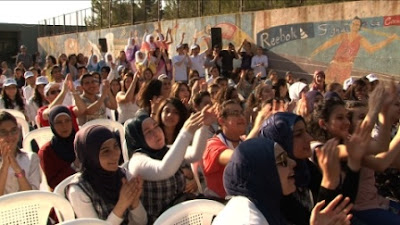 I
am sitting in Nandita’s apartment in Pune, enjoying the feeling of the hot
summer breeze on my bare legs and shoulders one last time before we head up to
Kupwara. I had braced myself for
both the June Indian heat and the North Indian religious values, but somehow my
brain had neglected to make the important leap of considering those two elements
in combination. Nandu abruptly connected
the dots for me as I unpacked my ill-planned wardrobe of tank-tops and
cut-offs: “In Kashmir? Are you
crazy?!”
I
am sitting in Nandita’s apartment in Pune, enjoying the feeling of the hot
summer breeze on my bare legs and shoulders one last time before we head up to
Kupwara. I had braced myself for
both the June Indian heat and the North Indian religious values, but somehow my
brain had neglected to make the important leap of considering those two elements
in combination. Nandu abruptly connected
the dots for me as I unpacked my ill-planned wardrobe of tank-tops and
cut-offs: “In Kashmir? Are you
crazy?!”
As
I soaked in the sights of this incredible new country on the drive from Mumbai’s airport, my head
was a flurry of questions. Who was
everyone honking at? Was the guy
in a dress shirt who stopped and interrogated us on the back-road a real cop? Why was everyone sleeping on the fruit
stands? And seriously, what was up
with the honking?
 Nandita
has answers for “what” and “how,” but consistently furrows her brow every time
I come to “why.” In a place with
such a multiplicity of narratives, she tells me, “why” isn’t really a question
one asks. Things just are.
Nandita
has answers for “what” and “how,” but consistently furrows her brow every time
I come to “why.” In a place with
such a multiplicity of narratives, she tells me, “why” isn’t really a question
one asks. Things just are.
After
a few days here I’ve relaxed into a quiet observation that allows for this kind
of unquestioning acceptance. I
wander for hours through twisting streets that take me past garbage heaps leading
to gorgeous perfumed gardens on pathways that appear and disappear with a logic
of their own. After crossing a
stretch of beach I arrive at a massive octagonal structure filled with pigeons
and seeds, a sign attributing its presence to the Lodha Charitable Trust. Is Lodha trying to keep the pigeon
population confined to this area of beach? Or does he just really like pigeons? Maybe he’s a Jain? These questions melt into a silent and goofy smile as I step back and
observe this massive birdfeeder.
Whatever the reason, it’s here in front of me now…and how weird and awesome
is that?!
Nandita
and I picked “Kashmir,” and everything else seemed to pick us after that. An
organization running orphanages for girls affected by armed conflict has
invited us to conduct a theatre project at one of their centers near
Srinagar. Their level of
support and hospitality has been incredible—even before our arrival in Kashmir
they are on the phones with us constantly, sorting our travel and putting us in
touch with some of the center’s older girls who are studying in Pune so that we
can stay with them and discuss our ideas for the piece.
The girls tell us that based on their backgrounds, the theme
of ex-combatants should come fairly organically and will be relevant and worth
exploring. Nandu and I brainstorm
side-projects and the issue of access comes up. If we reach out to
combatants and ex-combatants in Srinagar, she counsels, we should stick to
female fighters. This is purely
for practical reasons, given who we are and where we are going. I smile inwardly and realize I’ve
managed 9 months on this project without really having to grapple with the subject
of gender. Strangely, this
“restricted access,” the technical narrowing of our scope, doesn’t feel like a
restraint or limit. I’m not too
hung up on ‘why’ we’ll be working with women instead of men. Yesterday I was looking at an octagon
full of birdfeed. Today I’m
looking at sleeves in the sun, unparalleled hospitality, and the female
perspective on conflict. That’s
what is; that’s what’s here in front of me. Awesome.







